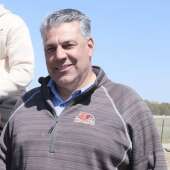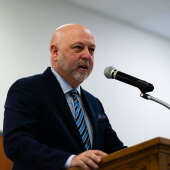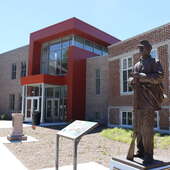Economist discusses inflation, job growth in Southeast Missouri at SEEDS conference

The Southeast Entrepreneurship and Economic Development Symposium (SEEDS) on Thursday, Nov. 30 brought together several local industry leaders and economic minds to discuss the state of Southeast Missouri’s economy heading into 2024.
Among the speakers at the event, senior economist Charles Gascon with the Federal Reserve Bank of St. Louis presented to the audience some of the latest economic trends and their impact on a national level.
Gascon said a recession was expected at the beginning of 2023, but that did not occur. However, there are signs that could point to one.
“If we see a recession occur in 2024, it will be one of the most anticipated in U.S. history,” he said. These signs include weakness in the manufacturing and construction industries and prolonged inflation. However, there are reasons to be optimistic about 2024, he said, including the country seeing record lows in unemployment.
Supply and demand
Supply chain delays have led to houses taking longer to build. This, Gascon said, has led to lessened levels of construction nationwide. However, more multifamily housing units are being built than at any time in the
country’s history, and manufacturers are creating a buffer to economic slowdown by catching up on projects delayed by the pandemic.
Responding to a question about low costs of living, Gascon said this is not necessarily an indication of a good place to live. Rather, he said, it can indicate somewhere that is undesirable. The main concern is if the demand for and supply of houses do not match, costs can go up faster without the population rising to match them. However, a higher cost of living in an area can actually mean higher amenities and a better quality of life.
Pandemic impact
Gascon said the pandemic had a huge impact on the economy, but the economy has since experienced a successful rebound. The average cash balances in peoples’ bank accounts are higher in 2023 than before the pandemic, though that average has started to decrease.
“The reason it’s running down is because when we look at the consumption data, we’ve seen continued really strong consumer spending, and spending is actually running much faster than income growth. The only way you can spend more than your income’s going up is if you’re running down your savings,” Gascon said.
Sales of durable goods such as cars and appliances experienced a massive surge in the last few years. Consumable goods sales have also gone up.
Inflation explanations
Gascon said inflation has been decreasing from a peak in 2022, but prices are still high.
“This does not mean to any level that we are going back to 2019 prices,” he said. “It just means prices today are not increasing at 8% year over year, it means they’re increasing at about 3.2%, broadly speaking.”
Economic theory posits that inflation is largely driven by what people think it will be in the near future. When there is strong demand for products but a constrained supply of workers and resources, inflation skyrockets.
If one discounts food and energy prices, costs are still going up overall. Some headway has been made, but Gascon said it will take plenty of time before inflation returns to pre-pandemic levels.
Working for a living
Job growth is slowing, Gascon said, but new jobs are still being created. He estimated around 125,000 jobs per month need to be created to keep up with increased workforce participation.
More people between the ages of 25 and 54, he said, are working now than at any point in the last decade. This includes disabled workers and new parents, and he surmised it was due to more remote work opportunities.
“This strong rebound in the labor supply has helped ease some of those labor market tensions, even in an environment where demand for workers still remains pretty elevated,” Gascon said.
Stars of the show
Gascon’s presentation was far from the only one at SEEDS.
Additional discussions included a panel hosted by Southeast Missourian publisher Jon K. Rust with regional healthcare leaders Ken Bateman, Justin Davison, Jason Schrumpf and Chris Wibbenmeyer; an entrepreneurship fireside chat with Codefi chief executive officer James Stapleton and Missouri Technology Corporation chair Dan Cobb; and a keynote presentation by economic futurist Andrew Busch.



































Respond to this story
Posting a comment requires a subscription.